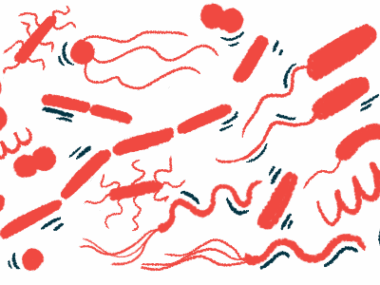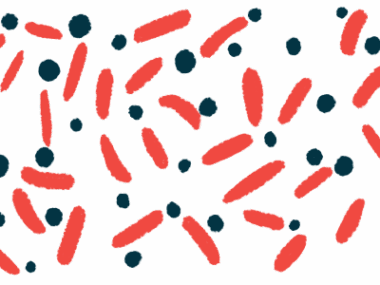Phage cocktail BX004 safe, seen to reduce P. aeruginosa in small trial
Part 2 of ongoing study to test nebulized treatment in more patients
Written by |

BX004, BiomX’s experimental phage cocktail — a treatment that uses certain viruses to kill disease-causing microorganisms — was seen to reduce the number of Pseudomonas aeruginosa bacteria present in the lungs of people with cystic fibrosis (CF) in the first part of a small trial.
The nebulized treatment also was found to be safe and tolerated well at all dose levels.
These findings come from part one of the Phase 1b/2a clinical trial (NCT05010577) that’s evaluating BX004’s safety and effectiveness against a placebo in CF patients with chronic lung infections caused by the hard-to-treat bacterium.
“We are very excited to share these positive results,” Jonathan Solomon, CEO of BiomX, said in a company press release, adding, “Although Part 1 of the study was designed primarily to assess safety and tolerability of BX004, a goal that was achieved, we are highly encouraged to see preliminary evidence of efficacy in patients treated with BX004 despite the small sample size and short duration of treatment.”
Treatment shows early efficacy in small clinical trial
The trial, underway at seven sites in the U.S. and one in Israel, is evaluating BX004 in up to 32 participants with chronic infections due to Pseudomonas aeruginosa. The bacteria, known as P. aeruginosa, is the most common cause of lung infections in people with CF.
According to Solomon, this is the first “placebo-controlled study evaluating a cocktail-based phage product to demonstrate notable reductions in bacterial burden in cystic fibrosis.” Bacterial burden refers to the number of bacteria present in an infected part of the body.
Based on the observed favorable safety profile of the therapy in the trial’s first part, dosing has begun in part two. This second part aims to evaluate the safety and efficacy of BX004 in a larger number of people, with results expected later this year.
CF is caused by mutations in CFTR, a gene that codes for a protein that helps regulate the movement of salt and water in and out of cells. In people with CF, the protein doesn’t work well, causing a thick, sticky mucus to build up.
This mucus can clog the airways and provide a breeding ground for bacteria and other germs to grow and thrive. It also can make it harder for the immune system to clear up infections on its own.
It can be difficult to treat P. aeruginosa with antibiotics. The bacteria can form biofilms, which are communities that hold tight onto surfaces and get under a protective cover that keeps antibiotics away. They also can undergo changes that allow them to become resistant to antibiotics over time.
“Despite the available new CFTR directed therapies, CF patients continue to suffer from intractable, persistent infections, such as those caused by P. aeruginosa, and new treatment approaches are clearly needed,” said Eitan Kerem, MD, a professor of pediatrics at the Hadassah University Medical Center, in Jerusalem.
Bacteriophages, or phages for short, are viruses that can kill specific strains of bacteria, while leaving other bacteria or human cells unharmed. It’s believed they may offer a way to overcome the limitations of current treatment approaches.
BX004 is BiomX’s proprietary phage cocktail designed to specifically target chronic P. aeruginosa lung infections in CF patients, Solomon noted in a company webcast presented Feb. 22. Preclinical studies showed that the therapy was effective against antibiotic-resistant strains and that it also helps breakdown bacterial biofilms.
The phage cocktail is delivered via a nebulizer “for efficient delivery directly into the lungs,” Solomon said in the webcast.
No side effects seen with use of phage cocktail
Part one of the Phase 1b/2a trial assessed the safety, tolerability, pharmacokinetics, and anti-bacterial activity of BX004 versus a placebo in nine adults with CF and chronic P. aeruginosa lung infections. Pharmacokinetics refers to a therapy’s movement into, through, and out of the body.
Seven participants received BX004, given as single ascending doses for three days, followed by four days of multiple doses; two individuals received the placebo.
Results showed that there were no side effects related to treatment with BX004. Phages were detected in all BX004-treated participants during the treatment period, and in several patients up to one week after the treatment’s end. In turn, no phages were detected in those who were on a placebo.
At day 15 after the start of the treatment or a placebo, patients given BX004 showed a five times greater reduction in mean P. aeruginosa burden relative to those on the placebo.
We are highly encouraged to see preliminary evidence of efficacy in patients treated with BX004 despite the small sample size and short duration of treatment.
There was no detectable effect on the mean forced expiratory volume in 1 second (FEV1) percent predicted, a measure of lung function. This was “likely due to the short course of therapy,” Solomon said in the webcast.
No signs of treatment resistance were detected during or after BX004 treatment.
“We would like to thank all of the patients, physicians and healthcare providers who participated in Part 1 of the study and our dedicated team and collaborators for all their work,” Solomon said in the release.
The company now plans to enroll up to 24 adults with CF into part two of the study. Participants will be randomly assigned to receive either the therapy (16 patients) or a placebo (eight patients) for 10 days.
According to Kerem, phage cocktails have shown promise as a novel treatment for CF.
“BiomX’s study results, in addition to previous data gathered through compassionate use, strongly endorse the potential of phage-based treatments in effectively targeting [disease-causing] bacteria within infected tissue. I look forward to the results from Part 2 of this study later this year,” Kerem said.
The Cystic Fibrosis Foundation is supporting the efforts of BiomX in advancing BX004. The foundation awarded up to $5 million to the company early last year for the clinical trial.
“We … appreciate the continued support from the Cystic Fibrosis Foundation, which, through its therapeutics development award program, provides significant resources to help advance new therapeutics for CF,” Solomon said.








